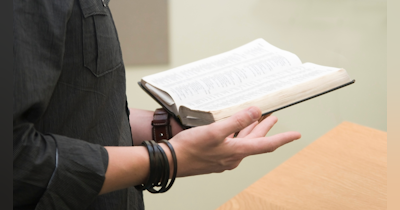It was a sweltering Sunday morning in the fall of 1986 when I plodded quietly into the kitchen to inform my mother that I was being molested.
The only problem was I didn’t actually know I was trying to tell her anything. I didn’t even know I was being molested. Or what molestation was. Or that telling someone about it was an option. As an innocent six-year-old, my brain didn’t yet have a definition for what was being done to me under cover of darkness, in my own home, by someone I and my family loved and trusted. All I knew was that something really bad was taking place, and I was terrified.
“Mommy,” I whimpered, “I can’t go to Sunday school. I have morning sickness.”
“Kelly, don’t call it that.” My mother was horrified that I had chosen to explain my alleged belly ache in such scandalous terms–on a Sunday morning, no less, just minutes before I was supposed to skip off to church with my brothers and sister.
Our dutiful missionary family adhered to a strict schedule every Sunday morning in Bandung, Indonesia. My parents sent us ahead of them on a short walk to a neighborhood “gereja” (church) so we could attend Sunday School, and they would join us afterward for the main service. I had never protested before; I always loved going to Sunday School. On this particular morning, though, I was suddenly beyond desperate to miss it, and I communicated that desperation the only way my six-year-old intellect knew how.
“I do have morning sickness,” I insisted, referring to the nausea I had been waking up with on Sundays. After all, I felt sick and it was the morning, so I didn’t think I could find a more appropriate use for the term that I’d heard tossed around by adults on occasion.
“No, you don’t. Morning sickness is something pregnant women get.”
My mom stood at the gas stove, probably rolling her eyes, stirring a gooey pot of oatmeal and raisins that we would momentarily be required to gag down without complaint. (Someday I’ll start a blog on dealing with the childhood trauma of being forced to eat cooked raisins. But I digress.) She reached down to touch my forehead, and I knew my mom was mentally assessing my professed “illness” to determine whether I was actually sick or just putting on a show in an attempt to skip out on church. I pushed my forehead harder against her hand, trying to conjure the heat of a thousand suns, and watched her face for any signs of empathy as she ticked through a mental is-my-kid-really-sick checklist.
“Child has heartbeat. Child is conscious. Child’s limbs are intact. Child has no fever. Child is not vomiting or suffering from explosive diarrhea. All data points to healthy child with sinful desire to stay home and play with Rainbow Brite rather than attend lengthy Sunday School at non-air-conditioned house church in tropical climate…”
It was clear that I was passing my health assessment with flying colors, and when my mom didn’t immediately agree to let me miss Sunday school, a sense of doom set in. I knew that if I couldn’t convince her that I was too sick to go, there was no way I’d get past my no-nonsense dad. Panicked, I shifted seamlessly into Plan B: Crying and Begging.
My tears and pleas for mercy weren’t of the “I want an oompa loompa NOW” variety. They were authentic signs of despair, brought on by my sheer terror at the thought of walking into that tiny Baptist Church without my parents as a flesh and blood barrier between me and him.
“Please,” I begged, tears streaming down my face, “my tummy hurts.”
Apparently moved by my weeping or the fear in my big green eyes (or the need to put all of her focus into making raisin oatmeal slop/glue semi-edible), she agreed that I could skip Sunday School and walk to church with her later. If my mom thought it odd that I was only claiming to be too sick for Sunday School and not the main church service, she didn’t mention it.
I remember the feeling of relief when I averted that first crisis of the day, but it was short-lived. Eventually, my parents were dressed in their Sunday best, and we made the trek along dusty dirt roads to face my greatest fear.
A first grader should never have to experience a “walk of shame.” Those are normally reserved for the morning after very adult, very drunken one night stands. But there I was, a six year old in a frilly Sunday dress, experiencing my own personal walk of shame on the short sidewalk leading up to our tiny Indonesian church. I was nauseated, humiliated and more afraid of seeing my abuser than I’d ever been of anything else.
I clung to my mother’s skirt as we approached a table where a group of Sunday School kids sat coloring pictures of Jesus. He was sitting with them, and when he looked up and saw me, his face split into a grin. I responded to his delight at seeing me with an angry scowl, but it didn’t have the effect I was hoping for. Instead, he appeared to accept my sour disposition as a challenge, and picked up a coloring page to attempt a game of peek-a-boo with me.
I will never forget that photocopied coloring page of Jesus, or my abuser’s face–in complete contrast to everything the picture stood for–peeking out from behind it, flashing that million dollar smile. The smile that had charmed my family into welcoming him into our home and our hearts. The smile I had seen on his face in the dark, as he did sinister things that only I knew about.
My stomach lurched as my tiny body attempted to contain the ocean of shame and fear that flooded me in that moment. I wanted the earth to crack open and swallow me up whole, but it remained brutally intact, so I opted to hide from the source of my shame instead. I buried my face in my mother’s skirt to avoid having to look at his stomach-turning smile.
Oblivious to my inner torment, my parents weren’t exactly huge fans of the way I snubbed the abuser’s attempts to greet me. Mom and Dad were embarrassed by my uncharacteristic rudeness, especially since we were communicating across cultures, and I got a stern talking-to for being disrespectful to an adult. In tears, I blamed my upset stomach once again for the way I was behaving. Only this time I remembered not to call it morning sickness.
And that was it. I wish I could share a more satisfying ending to the Sunday I tried to communicate that I was being abused, but there just isn’t one. My slightly “off” behavior on that random morning was the closest I would ever come as a child to saying out loud that I had been molested. My scared, six-year-old self, drowning in shame, sent out much more subtle cries for help. Cries that were easily lost in the busyness and chaos a typical Sunday morning in our lives entailed.
It would have been so much more convenient for my poor mom and dad if I had strode into the kitchen that morning and declared, “Parental Units, I don’t want to go to church today because a man there–one of your favorite men–has been molesting me, and I’m scared to be around him without you.” As you may have guessed, though, approximately zero percent of things related to sexual abuse are convenient.
I wish that stories like mine were rare, but statistics tell us that they are more common than not. Nearly 75% of children who are molested will not disclose their abuse for at least a year. Almost half of victims will wait a minimum of five years to tell. Many will take the secret of their abuse to their grave.
There are so many things working against openness and honesty where sexual abuse is concerned, yet there is a pervasive belief among parents that their children would definitely vocalize it if something were wrong. At the very least, most parents believe that they would recognize it if their child were exhibiting signs of abuse. But without a frame of reference, who would have guessed that my morning tummy ache was something more complex than a stomach bug or bad dinner? Who would have labeled my out-of-the-blue aversion to attending Sunday School as anything other than a desire to stay home and play with toys? Who would have wondered if my sudden clinginess with my parents or my snubbing of a man at church was something more serious than an effect of not feeling well or simple moodiness?
The signs of abuse can be easy to miss, but they’re easiest to miss when you have no idea what to look for. If you’d like to better understand how to protect your kids and how to identify the signs of sexual abuse, this site is a great place to start.







